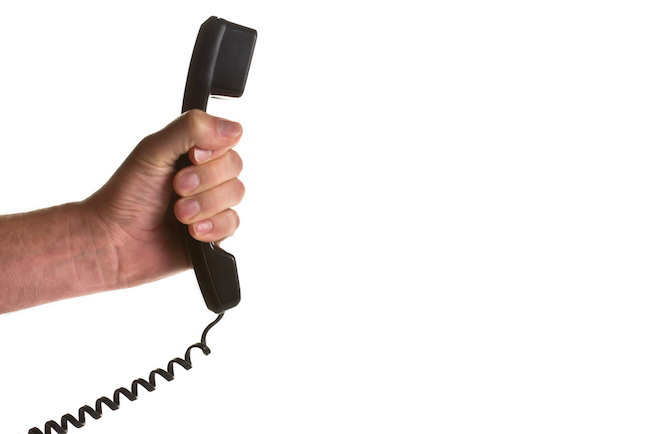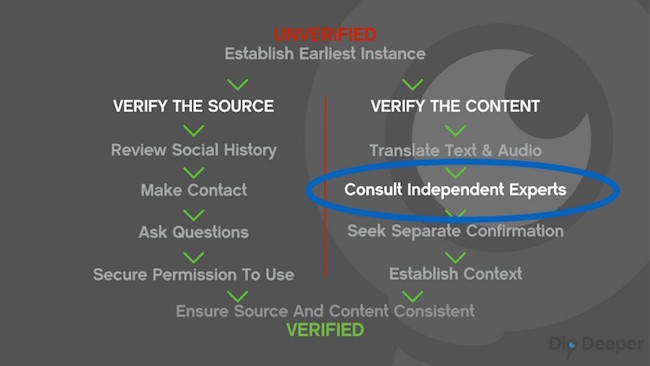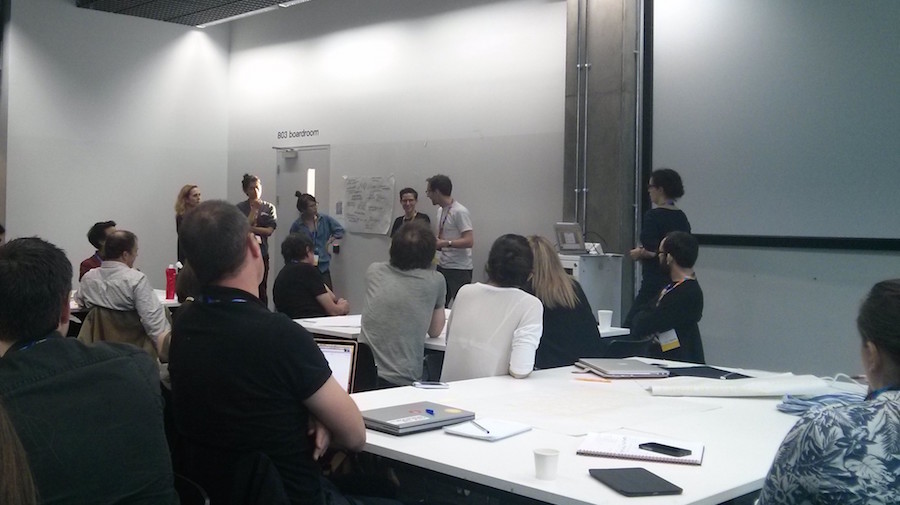Collaboration for verification is what will drive the news industry’s progress in this space forwards — and faster. New tools will emerge and workflows will be created to integrate them but without tapping the growing knowledge within our own newsrooms — and those of our colleagues at other news organisations — we will be at a disadvantage.
After all, why start from scratch when somebody has probably already come up with an answer they can share with you? Why harass an eyewitness for access to their video when a colleague may already have it? What about collaborating with competitors to secure newsworthy material? You might just be surprised where you have allies.
In my view there are three compelling reasons why collaboration in digital newsgathering is worth pursuing.
Speed and efficiency
Within an organisation, collaboration is really all about knowing what your actual colleagues are doing. This is easier said than done, however, as we increasingly store things digitally rather than communicate verbally and have more things to read than we can manage in a day, stored in more places than we can remember (or bookmark).
“One of the biggest barriers to collaboration is communication: people not knowing what is going on,” says Alison Gow, digital innovation editor at Trinity Mirror Regionals.
Knowing what others around you are doing is essential to speeding up the verification process. By working out efficient communication methods you’ll quickly learn if somebody already knows that a particular news event is occurring. You’ll also easily identify duplicated efforts for sourcing content from uploaders.
Efficiencies in collaboration will serve you beyond verification as well.
“We use secret Facebook groups and internal tools such as Slack and Trello to share ideas, progress content plans and develop ideas,” Gow told me recently. “The Facebook groups are niche (digital sport, video, social media, storytelling tools etc) and we share ideas across all our newsrooms, ask for advice, put up plans and other tools that could benefit colleagues in other parts of the country.
“It also builds tight collaborative relations between journalists who may sit in newsrooms a few hundred miles apart, but who face common problems or issues, or are covering linked stories.”
Proper communication can make geographic restrictions irrelevant. Tools like Slack are amazing creations but are not always the most efficient way to communicate with colleagues who already have enough programmes and tools open on their computers.
The quickest and best way to communicate key information quickly? The good old telephone.

LearningVideo/Flickr. Some rights reserved
“Our resources are finite and by pulling together we become much more effective,” said Gow.
In a similar vein, technology that allows you to store information for colleagues to come back to later is essential, especially if you are in a news organisation, large or small, that relies on shift work. Tools like Checkdesk and SAM Desk allow you to show everything you are working on with colleagues, whether they are currently in the office or picking up the work long after you have left.
But in high-pressure breaking news situations the best way to communicate key information to reap the benefits of a collaborative environment is to simply get up talk to the person. When things are really kicking off? Stand up and shout.
It’s not high-tech, and it certainly isn’t digital, but it works. The standy-uppy shouty moments can prevent last-minute verification mistakes being published, or move your team to work faster on a story.
Expertise
Nobody knows everything, but someone probably knows something about what you are verifying. In the process that I use, one of the key elements in content verification is to run it past someone who might know about the subject in question.

Fergus Bell/Dig Deeper Media
Trying to verify something by analysing speech or a sign in a language you don’t speak? Rather than rely on a translation tool, see if there is someone you might know who is actually a native speaker. Translation tools can’t tell you the dialect or the region an accent may come from. Creating a database of these staff for just such occasions will set you up for the future.
Something happened in a prominent location but you can’t quite find it on Google Streetview? Newsrooms are full of people who have been to all sorts of places. It’s worth asking around to see if someone you trust can take a look at the image or video you are working on. They might just unlock the key part of the verification for you and might be able to give additional context to the verification work.
An expert doesn’t even have to be someone in your newsroom. They may be someone you know with a personal passion for a subject that happens to be relevant to the work you are doing — like a self taught weapons expert.
You can also think about asking your audience for their expertise to help you, from translation work to geo-locating a specific image.
Seeking a summarised translation of this Arabic statement for @reportedly. Thanks. pic.twitter.com/zJisZhz03y
— Malachy Browne (@malachybrowne) April 16, 2015
@malachybrowne Ansar Al-Sharia deny they’re behind beheading video of Yemeni troops, don’t agree with that tactic
— Abubakr Al-Shamahi (@abubakrabdullah) April 16, 2015
@abubakrabdullah Thanks Abubakr
— Malachy Browne (@malachybrowne) April 16, 2015
Ethics
A regularly highlighted problem is the bombardment eyewitnesses face from the media when they have content news organisations want.
When you have content that news orgs want… Few individuals did anything wrong but together we *must* do better. pic.twitter.com/QPPc42wlq4
— Fergus Bell (@fergb) July 8, 2016
We simply must do better. But how?
Collaboration seems an obvious solution but one that would require us to perhaps put aside competitive differences in certain situations to prevent harassment.
Tom Trewinnard has already provided a number of technical solutions to duplicated permission requests from the same — or even competing — organisations. However, direct and proper collaboration with our colleagues across the industry is probably the next necessary step that we need to take.
There are already some existing models where this can work.
Agencies like Reuters, Storyful and the Associated Press, or membership organisations like the the European Broadcast Union, often negotiate access to eyewitness media for large numbers of clients and members in one go.
@bobbysmith2765 Hi Bobby, please may @AP run your video and share with other news media? (see attached). Thanks! pic.twitter.com/gHM8wL5vxf
— Philippa Law (@philonski) August 5, 2016
The Associated Press attaches release forms securing access for its members and customers as images to their tweets.
Hello @UrazKaspar, Can we share your video with EBU members, European public broadcasters w/ credit you.Thanks, AM pic.twitter.com/0QlmscHJ0h
— anne-marie lupu (@AMLoOpOo) January 12, 2016
Eurovision News strives to secure access to any UGC for all of its 70+ members
This can really work as a way of cutting down the bombardment of requests going out to individual content producers but only if the people you are negotiating on behalf of know you are doing so — and don’t put in their own requests.
“Our clients don’t need to approach witnesses on social media to ask for permission to run UGC, because they know they can rely on the Associated Press to verify and clear content on their behalf,” the AP’s social media and UGC editor, Philippa Law, told me.
“It’s good to know that our work to obtain validated UGC may help to reduce the number of duplicate requests witnesses receive.”
What we haven’t really seen yet is publishing groups working together to use one ‘point’ person per story to gain access to content from individuals for all their colleagues.
Alliances between friendly organisations that don’t compete in the same market may also be a solution to cutting down on requests. Some of us have previously floated the idea of a pool for securing access to eyewitness media from breaking news, but this seems impossible to govern right now.
Instead — in the short term anyway — we most likely need to rely on our own ability to work together to form alliances for newsgathering as a whole or even just for gaining the right to use newsworthy content. Collaboration will make us more efficient at our work, make full use of the the expertise available and protect those who contribute to our work. At the very least we can all work out how to use our corporate telephone directory.



